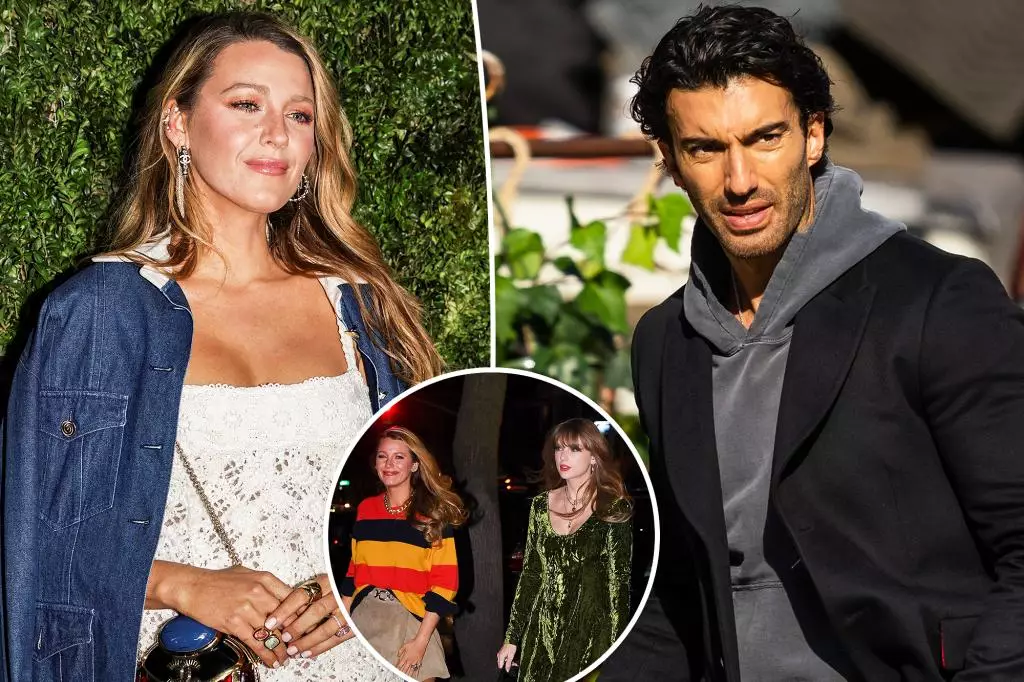In the glitzy world of Hollywood, personal lives often become fodder for public consumption, especially when tensions flare into legal disputes. Recently, actress Blake Lively has taken a significant stand in her ongoing legal battle against director Justin Baldoni, involving a protective order aimed at safeguarding her private communications. The latest developments not only highlight the complexities of celebrity relationships but also the ethical boundaries that should be maintained in the pursuit of information during legal proceedings.
Lively has formally requested a protective order from the New York court presided by Judge Lewis J. Liman, questioning Baldoni’s intent to access her text messages with the pop superstar Taylor Swift. This challenge lays bare the tactics sometimes employed in legal conflicts, where the strategy seems to revolve around exploiting high-profile connections rather than focusing on the crux of the matter at hand.
Permissible Inquiry or Media Exploitation?
Lively’s legal documents assert that Baldoni’s pursuit of her communications with Swift is not just unnecessary but also irrelevant to the core issues of the case. She alleges that Baldoni’s team has systematically weaponized Swift’s name to engage the media and manipulate public sentiment. Such claims raise a crucial question about the ethical dimensions of legal inquiries: where do we draw the line between permissible investigations and exploitative tactics designed for media sensationalism?
The actress’s team criticized Baldoni for his strategic use of Swift’s fandom—one of the most loyal and fervent in the entertainment industry—as a mechanism to distract from the specifics of the lawsuit, which includes allegations against Lively and her husband, Ryan Reynolds. This strategic maneuvering can be perceived as an attempt to undermine Lively by casting her as someone who wields celebrity status to dilute the legitimacy of the claims against her.
The Unraveling of Legal Claims
Compounding the dramatic developments, Baldoni’s legal troubles have deepened with the recent dismissal of both his countersuit against Lively and a libel lawsuit against the New York Times. Judge Liman’s ruling emphasized that Baldoni’s assertions lacked the requisite legal grounding, asserting that the statements made by Lively were protected under privilege.
This judicial challenge underscores a broader narrative within the industry—a reminder that even high-profile personalities are subject to the limitations of legal frameworks. It reflects an evolving legal landscape where celebrity status may not unequivocally shield one from scrutiny if the claims are deemed unfounded. As the director’s team scrambles to amend their claims, the protracted nature of this conflict signals that both parties have much at stake, both in terms of reputation and resources.
Defending Privacy in an Era of Public Intrusion
Lively’s fight for a protective order signifies a significant stand for personal privacy amidst relentless public and media scrutiny. In an era where celebrity interactions are frequently broadcasted across social media platforms, safeguarding personal correspondence seems increasingly vital. The implications of allowing such invasions into private communications can be far-reaching, impacting not just the individuals directly involved but also the deeper societal norms surrounding privacy and consent.
The ongoing battle to reclaim this privacy extends beyond Lively; it’s representative of a larger discourse on the role of personal boundaries in celebrity culture. By defending her right to privacy, Lively raises awareness about the precarious nature of celebrityhood, where the invasion of personal space becomes an all-too-common occurrence, often at the expense of individual dignity.
The Role of Legal Representation and Media Narrative
As Lively navigates this tumultuous legal landscape, the question of representation emerges as equally critical. Having a robust legal team equipped to challenge intrusive practices is essential in holding the line against overreach by opposing parties. Lively’s assertive approach signals to others in the industry the importance of standing up to practices that could lead to unwarranted public scrutiny and reputational damage.
Moreover, the media’s role in amplifying this story cannot be overlooked. The intricate relationship between legal disputes among celebrities and media coverage not only shapes public perception but can also serve to pressure parties involved in the litigation. Lively’s acknowledgment of this dynamic reflects a nuanced understanding of her environment and a commitment to navigating it with integrity.
Blake Lively’s legal battle with Justin Baldoni reveals critical insights into the intersection of privacy, media influence, and the responsibilities of the judicial system. By standing firmly against the encroachment into her personal life, Lively not only fights for herself but also champions the importance of individual privacy rights within the relentless spotlight of fame.

